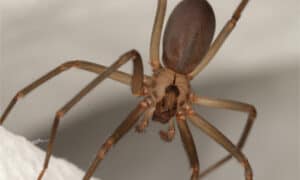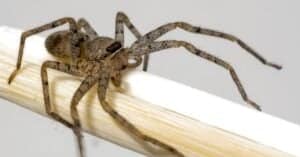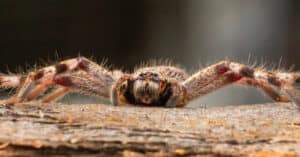Wolf spiders are hairy arachnids of the Lycosidae family, a diverse family of spiders distributed globally. It comprises about 124 genera and more than 2,800 species of wolf spiders.
These spiders are found in different habitats, both coastal and inland. They are common in wet coastal forests, woodland, shrublands, alpine meadows, and suburban and garden homes.
Wolf spiders do not spin webs to catch prey. They are opportunistic hunters who prefer chasing the prey or ambushing it near the mouth of their burrows. Wolf spiders are typically shy and introverted and choose to flee when disturbed.
Wolf spiders are generally small, with most species ranging between 0.4 and 1.38 inches (10 and 35 mm) long. They have excellent eyesight provided by eight eyes arranged in three rows.
Like most spiders, wolf spiders are primarily insectivores, and their diet mainly consists of insects. They are known to inject prey with venom and feed on it. But what about eating other venomous spiders? Do wolf spiders eat brown recluses and black widows? Read on for more information!
What Do Wolf Spiders Eat?
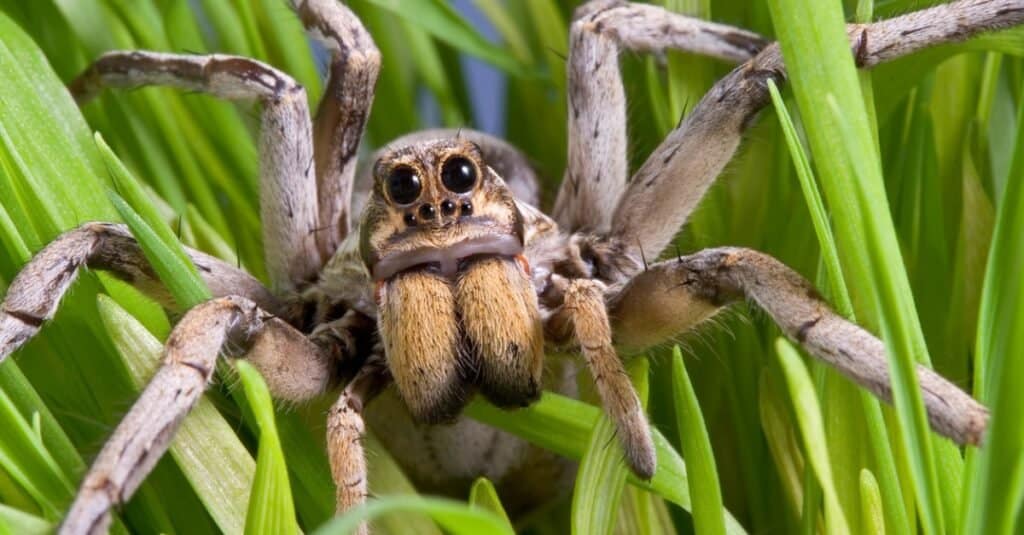
Wolf spiders eat ground-dwelling insects, such as worms, ants, beetles, earwigs, aphids, and millipedes.
©iStock.com/CathyKeifer
Wolf spiders are primarily insectivores. They are characterized as generalist predators of small, soft-bodied arthropods of Arachnida and Insecta classes. They mainly eat ground-dwelling insects, such as worms, ants, beetles, earwigs, aphids, millipedes, and many more. However, their diets vary depending on climate and location.
Wolf spiders are also known to eat small frogs and toads. Their diverse diet enables them to live in almost any environment where small invertebrates are found.
Do Wolf Spiders Eat Brown Recluse, Black Widows, Or Other “Bad” Spiders?
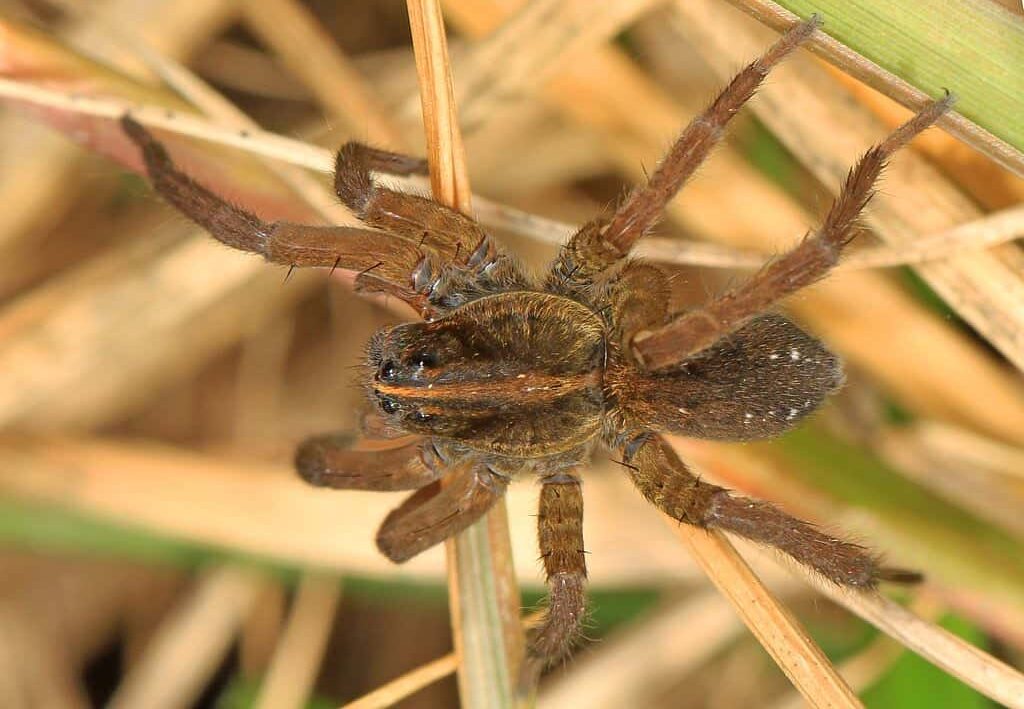
Wolf spiders prefer going after smaller spiders, sometimes even baby brown recluses and black widows.
©Judy Gallagher / Creative Commons – License
Wolf spiders sometimes eat smaller spiders in their habitat and prefer going for spiders that do not have proper defense mechanisms against them. In some instances, if the opportunity presents itself, wolf spiders might even pursue larger spiders, such as brown recluses, black widows, and other poisonous spiders.
The brown recluse spiders are often mistaken for wolf spiders due to their similar appearances. Both species are small insects of almost the same sizes found in the same habitats. The most obvious difference between the two is the number of eyes. Wolf spiders have eight eyes, while brown recluse spiders have only six eyes. Compared to wolf spiders, brown recluse species are considered venomous, and their painful bites are believed to damage skin and kill nerve cells.
Like brown recluse spiders, black widow bites are considered dangerous, especially from female black widow spiders. A black widow’s venom is reportedly 15 times stronger than a rattlesnake’s. However, they deliver less venom than snakes, so their bites are rarely life-threatening.
Wolf spiders ambush brown recluses, black widows, and other venomous spiders without the fear of being injected with the venom. Nevertheless, they only eat such spiders when there are very limited food options.
Wolf spiders prefer going after smaller spiders, sometimes even baby brown recluses and black widows.
How Do Wolf Spiders Hunt?
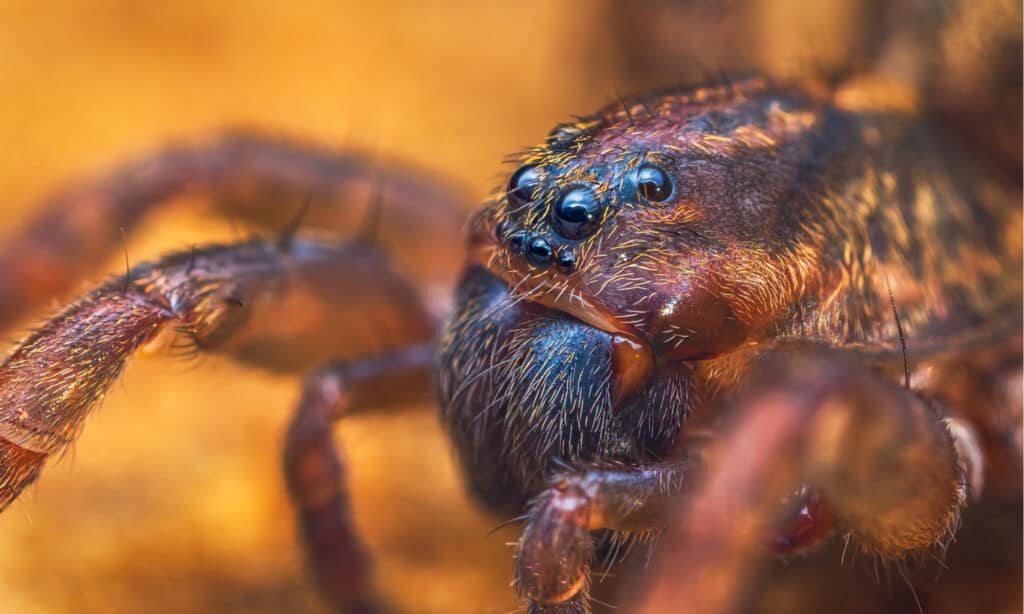
Most wolf spiders wait near the mouth of their burrows to ambush prey.
©Lukas Jonaitis/Shutterstock.com
Wolf spiders are opportunistic hunters. Most species wait near the mouth of their burrows to ambush prey. Upon sighting a prey, they pounce on it from a great distance. Other wolf spiders prefer chasing down prey. They are fast and robust, with excellent eyesight that helps them spot prey from a distance. This feature gives them a good advantage over many other spiders with poor eyesight. This is also why other spiders are more susceptible to getting eaten by a wolf spider.
Once wolf spiders catch prey, they pin it down, roll it into a ball, or inject venom directly into its body to liquefy its organs. The wolf spider will then suck out nutrients from the prey’s body.
Wolf spiders are more cautious when hunting other spiders. They use all their hunting skills to avoid endangering their lives, especially if they are after “bad” spiders. Instead of chasing after other spiders, they prefer waiting to surprise the unsuspecting arachnid. The most critical thing for wolf spiders is patience, which allows them to succeed when hunting other spiders. Once they strike, they quickly inject the venom to paralyze other venomous spiders.
Venom from dangerous spiders, such as brown recluses and black widows, is potent enough to kill a wolf spider. So wolf spiders must be careful not to get bitten if they choose to attack poisonous spiders.
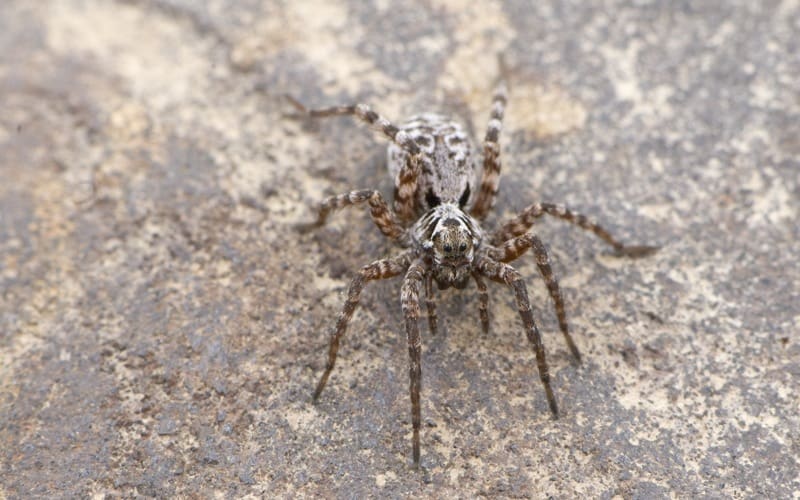
Arctic wolf
spiders are cannibalistic.
©D. Sikes / CC BY-SA 2.0 – License
Do Wolf Spiders Eat Each Other?
Sexual cannibalism is very common in the spider family. The same happens with wolf spiders, though it does not happen as much as in other spider families. Some female wolf spiders eat the males right after breeding.
A study shows that competition among female wolf spiders may increase if one produces more offspring. This triggers higher rates of cannibalism and reduces the number of young spiders that survive to adulthood.
How Long Do Wolf Spiders Live?
For wolf spiders, the duration of years they get to live depends on their gender. Males usually live for 12 months or two years at the most. Females, on the other hand get to three years. As a matter of fact, they are actually capable of living for several years making them luckier in this regard compared to their male counterparts.
What Repels Spiders?

Tea tree oil is an excellent alternative to commercial pesticides to repel spiders and other unwanted pests in your home.
©AmyLv/Shutterstock.com
One of a person’s worst nightmares is having spiders wind up in their home–especially the poisonous kind! The best way to avoid getting bitten by a spider is to try and prevent them from entering your house in the first place. As spiders can get into your home through holes and cracks, you can check for possible entryways with a flashlight. If the light gets through from the inside to the outside, you should fill that hole or crevice with an appropriate product.
Keeping your yard free of debris and overgrown vegetation helps cut down on areas spiders would gravitate to. Caulking doors and windows is also a good strategy to keep them out.
Spiders hate certain scents, so scented essential oils can help deter them like peppermint, tea-tree, lavender, and rose. You can add 15-20 drops of a particular oil in a water bottle mixed with water and spritz it around your house. They also hate the smell of cinnamon and vinegar, so these scents can be used similarly.
Rubbing lemon or orange peels on the baseboards along your walls, on window sills, and on other surfaces can also repel spiders, who dislike citrus smells. Furniture polish and cleaning products with lemon scent can also help.
Regular cleaning inside your home, especially in areas that are dark or less frequented, is necessary to keep spiders from setting up residence. It’s also important to keep an eye on fruit bowls, as they can attract spiders.
The photo featured at the top of this post is © Katarina Christenson/Shutterstock.com
Sources
- Live Science, Available here: https://www.livescience.com/39919-black-widow-spiders.html#section-how-toxic-is-the-black-widow-s-bite
- Science Direct, Available here: https://www.sciencedirect.com/science/article/abs/pii/S0733863518304996
Thank you for reading! Have some feedback for us? Contact the AZ Animals editorial team.



